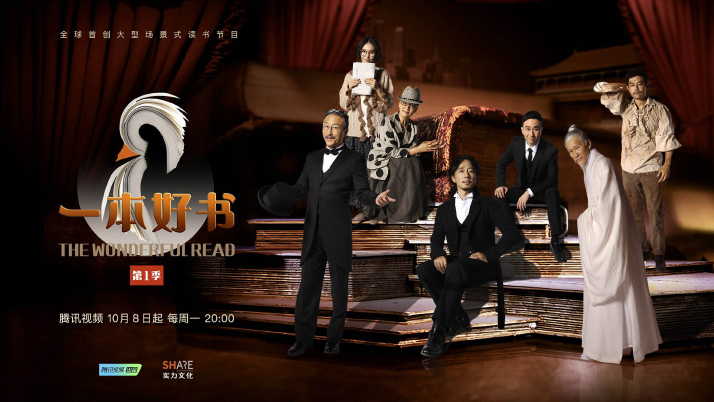| Lifestyle |
| Meeting Best Friends | |
| TV show to promote reading gets a big hand | |
|
|
 A poster for The Wonderful Read (FILE)
It was a tough battle for U.S. playwright Helene Hanff who struggled in the 1940s and 50s to find a producer for her work. But more than two decades after her death, the unfulfilled author has found fulfillment in a country that didn't figure in her life when she was alive—China. Hanff's fame largely rests on 84, Charing Cross Road, the book she wrote based on her correspondence with the manager of a London bookstore, which was later adapted into a play and also made into a film. The book, published in 1970, got a fresh lease of life when a program that aired on Chinese video website V.qq.com and local TV channel Jiangsu Satellite TV for three months did an episode based on it. Guan Zhengwen, director of The Wonderful Read, the 12-episode series that started in October 2018, said the intention was to recommend books to the audience, using different formats. Hanff's book was brought before Chinese viewers in the sixth episode aired on November 12, 2018. The novel revolves around her love for books, which went perfectly with the purpose of the series. In 1949, Hanff saw an advertisement by Marks and Co, the bookstore that specialized in out-of-print books, and wrote to them with a wish list of titles she'd been unable to acquire in New York. The store manager, Frank Doel, sent her some of the items she wanted and promised to look out for the others. It fostered a transatlantic relationship that lasted for two decades with Hanff getting to know the staff even though they never met, sending them food parcels when the UK faced scarcity after World War II. The title of her book came from the address of the store. Chinese writer Zhi An was one of the guests in the episode 84, Charing Cross Road. He said Hanff wanted to buy second-hand books because she was nostalgic about the fine books produced before the war. After the devastation, due to the shortages and mass printing, the books that followed were crudely made. "Now e-books are replacing paper ones," Zhi lamented. The Chinese author told viewers that he never buys books online. He likes visiting brick-and-mortar stores because of the sense of pleasure he derives from touching and selecting books, which cannot be had during online shopping. Reading a book, Zhi said, is like making friends with people who are finer beings than we are and who can't be found in our everyday life. However, in today's modern society when the pace of life is getting more frenetic by the day and people live their lives wrapped up in their mobile devices with little time for other engagements, people are reading less and less. According to a report published by the Chinese Academy of Press and Publication in 2018, the Chinese read 4.66 paper books per person on average in 2017. China lags behind developed countries and regions such as the United States, Japan, South Korea and Western Europe in this regard.  A child reads in a library in Taiyuan, capital of north China's Shanxi Province, on December 31, 2018 (XINHUA)
From classics to sci-fi Guan said they chose classics for the 12 episodes as well as books that have made it to various lists and inspire people to think. The titles featured in the series covered a broad range, from Love in the Time of Cholera by Nobel laureate Colombian novelist Gabriel García Márquez to The Three-Body Problem by modern Chinese writer Liu Cixin, which won the Hugo Award for science fiction in 2015. The series featured a popular favorite, The Moon and Sixpence by British writer William Somerset Maugham. The novel, loosely based on the life of painter Paul Gauguin, was presented in the form of a play. Victor Huang, the popular actor from Taiwan, played Charles Strickland, the London stockbroker who abandoned his wife and children to devote his life to painting. The series also ventured to present less well-known books like A Brief History of Humankind and A Brief History of Tomorrow by Israeli historian Yuval Noah Harari. Crosstalk performer Wang Zijian presented them in the form of a talk show. More than one Chinese author featured in the program. 1587, A Year of No Significance: The Ming Dynasty in Decline by Chinese historian Ray Huang was also presented in the show despite the difficulties in doing so. In the book, the writer finds in the seemingly unspectacular events in that ordinary year of Emperor Wanli's reign (1563-1620) signs of the subtle but inexorable forces that brought about the paralysis and finally collapse of the Ming Dynasty (1368-1644). It was not an easy task as the book has few dramatic dialogues. The show cast actor Wang Jinsong as the emperor who in his tomb reviews his life. The series was hosted by Chen Xiaonan, a popular anchor with Hong Kong-based broadcaster Phoenix TV, who discussed the books with scholars and writers in between the performances. Window to cultures The stage layout was unusual, with the audience sitting in the middle, encompassed by the round stage. Despite a limited budget, the designs were meticulous, with nearly 100 people involved in designing, making props and costumes. The background changed every 48 hours, from an inn in Paris to a Chinese palace in the Ming Dynasty to the space in the future. Guan hopes the series, which ended in December, acted as a window for viewers. The feedback he wants the most is that after watching the show they really wanted to read the books recommended. "I want to stimulate people's interest in reading rather than reading the books for them. Therefore we presented only a part of the books. Throughout the program, we repeatedly told the audience that if they wanted to read the book, they could leave immediately to start reading," Guan told the media. Owing to the tight budget, each episode had to be shot in two days. The crew often worked over 20 hours at a time. Wang Luoyong, China's first actor to star on Broadway, who played the male protagonist in Love in the Time of Cholera, slept only four hours in two days. "The actors were paid a pittance. They came simply to promote good books to the public," Guan said. He has directed a number of cultural TV shows in recent years, including the Chinese Character Dictation Competition and Chinese Idiom Conference. He also directed Letters Alive, a show which invited stars to read and reinterpret letters written by celebrities ages ago or by ordinary people from modern times. The Wonderful Read has won high praise, scoring 9.3 out of 10 on Douban.com, a renowned Chinese website for reviews. People get a great sense of satisfaction from watching cultural programs, something which entertainment programs cannot provide, Guan said. Copyedited by Sudeshna Sarkar Comments to jijing@bjreview.com |
|
||||||||||||||||||||||||||||
|